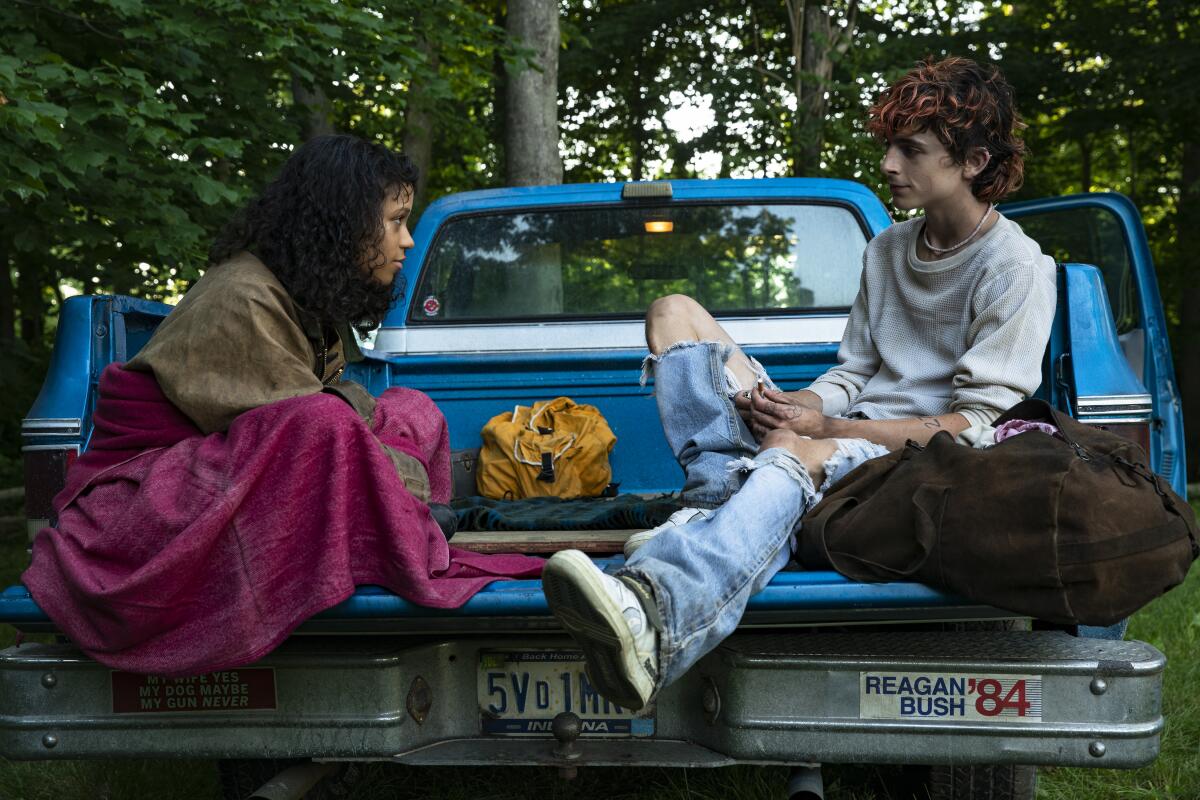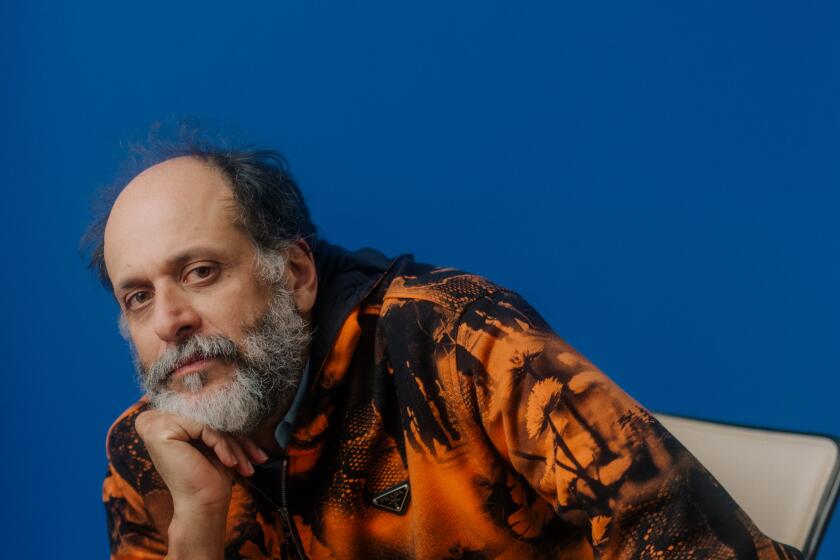Taylor Russell delves into deeper themes — desire, isolation — behind the cannibalism

- Share via
“Bones and All” director Luca Guadagnino had been thinking about Taylor Russell ever since he saw her breakout performance in the 2019 family drama “Waves.” So when he needed to cast the role of Maren — a thoughtful teenager with a consuming urge to eat people, bonded to Timothée Chalamet’s similarly plagued outcast — the choice was obvious. “She’s someone who showed a softness that was not completely hiding a strength, a steel,” says Guadagnino. “The combination of those was very compelling to me. I gave her the movie immediately.”
The Vancouver-born actor brings all that and more to a sensitive yet flesh-thirsty role that’s winning her even more acclaim. “It had been a while since something that special had come across my desk,” Russell recently told The Envelope. “I could really delve into deeper themes I’m curious about, like what we bring forth from our ancestors, what addiction and isolation means. I understood the deeper meaning of it.”
Why do we love outlaw romances so much?
I think the American landscape is a very special thing. There’s a kind of complexity and solemnness within it. We’re fascinated with American culture and the fantasy of freedom, that you can run away with your lover, romantically, or in a friendship sense. “Bonnie and Clyde,” “Badlands,” “Thelma & Louise.” Or with your dog! There was that movie Michelle Williams did, “Wendy and Lucy.”
This one, of course, includes cannibalism. But it feels like just the prism through which to address addiction, family secrets, homelessness, adoption.
This is why I love talking to people about [“Bones and All”]. Somebody else [mentioned] feeling like your sexuality as a woman is something that’s weaponized from an early age, before you even understand it. These things are being reflected to me through the film now, which is such a gift, to have your perspective opened in that way.
The ‘Bones and All’ director is more attracted to the idea of the impossibility of one’s nature than the blood and unnaturalness of his characters.
On a practical level, is it easier or harder to act with blood all over you?
It’s definitely more fun. And it tasted good! [Laughs] There was one closeup on my eye, with blood hitting my eye, and Luca was like, “Can I do it?” He was like a little kid with the spray bottle, spraying my eye off camera. So I have funny memories of that, like being stuck to things physically, peeling [myself off].
How did you work out Maren’s physicality when she’s hungry?
Luca definitely had a specific vision about what it should look like, the cannibalism element. That it should feel, you know, maybe you shouldn’t be watching it, that it’s this intimate physical embodiment of something that you don’t really want to look at, but you kind of do. And I think that’s fascinating. There was really no preparation for that, so I just trusted that on the day I would have the right people around to make it as accurate as it could be.
This movie does seem to touch on appetites, and dealing with one’s desires.
I was listening to something the other day that talked about how the culture we’re in right now, there’s this dangerous thing happening: loss of desire. Because things are so immediate. Desire can come from boredom, and it can come from fantasizing and thinking. But when you have all the answers in front of you, you don’t have to be pushed to go there. That’s something that’s on my mind. It’s important to crave, whatever that means.

Since much of your performance’s sublime power comes from shots of you not saying anything — just observing, processing, figuring out who you are in this world — is that what an actor craves?
Every time it’s different, depending on the character, the story. I will say as a person, I’m not the loudest in the room. A lot of times, I prefer listening. But it doesn’t mean I’m not worried that it’s so boring and people are like, “Why do we care to watch her thinking?” [Laughs] But I prefer to be quiet. That’s probably, I don’t know, cowardice on my end or something.
It’s definitely dynamic in “Bones and All.” Did Maren’s baggy clothes help put you in the mindset of someone hiding in plain sight?
Costume is so important. I loved at the beginning, when you see her with her contemporaries, you notice that she has this strange haircut and her clothes are darker. She’s not so much in the pastels of the ‘80s. She’s somebody who feels invisible in her life, so clothes are helpful getting that across. I think her dad’s jacket, which is obviously oversized, acts as a sort of invisibility cloak and comfort blanket. Giulia Piersanti, who did the costumes, was very thoughtful about keeping it accurate to the time period, and androgynous but very comfortable.
What was your comfort level playing Maren?
You know, when I first got to Ohio, I was feeling all these sweeping emotions, like, “There’s no way you’re going to pull this off, they made a mistake …” All the normal actor feelings that are annoying. Then the thing that came into my head was, no matter what, I’m at the best film school I could ever be at, and how lucky I was to be there. And I really feel, honestly, it’s one of the best experiences of my career so far. And when I’m older, I think I’ll still feel like that.
More to Read
From the Oscars to the Emmys.
Get the Envelope newsletter for exclusive awards season coverage, behind-the-scenes stories from the Envelope podcast and columnist Glenn Whipp’s must-read analysis.
You may occasionally receive promotional content from the Los Angeles Times.







